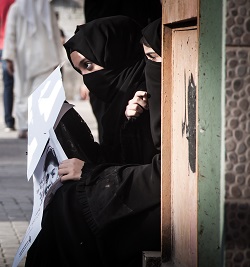On 13 June, 11 members of Congress – led by Representatives James P. McGovern (D-MA), Henry C. “Hank” Johnson (D-GA) and John Conyers, Jr. (D-MI) – sent a letter to Secretaries Hagel and Kerry encouraging them to play a stronger role in addressing the political upheaval in Bahrain.
Please click here for a translation of this letter in Arabic.
The United States has had a decades long relationship with Bahrain, which includes strong diplomatic, economic and military ties. Despite this, the U.S. Government has done little publicly to leverage this to encourage the government to take necessary steps to resolve the political crisis in the country. Yet there are steps that the U.S. can take to help its ally to move toward stability.
One of them is easy, and is something that the Administration has done in plenty of other countries: publicly call for political prisoners to be released and to be included in any potential national dialogue in order to give the dialogue a chance to succeed. This is a no-brainer, and is something that even President Obama called for in a May 2011 speech. Yet as the letter points out, this has not been done publicly by the administration since, with the cosignatories rightly urging that “this message be restated publicly, clearly, and immediately by the President or a senior administration official.”
The letter also calls on the U.S. Government to “use its strong military relationship with Bahrain to push for greater diversity within the Bahraini security forces.” This recommendation was notably included in the 36 recommendations of the Bahrain Independent Commission of Inquiry (BICI) — an independent commission that was created by the Bahraini King himself — and is one of the recommendations that the government publicly promised to implement from the BICI report. Despite claims by the Bahraini government that it has implemented all of the BICI recommendations, there is plenty of evidence to suggest otherwise. The letter also rightly points out following the U.S. Commission on International Religious Freedom (USCIRF) trip earlier this year to Bahrain, the Commission reported that “Members of the Shi’a community still cannot serve in the active military, only in administrative positions,” and that there are “no Shi’a in the upper levels of the Bahraini government security apparatus, including the military and the police.” This step is a critical trust building measure among the Bahraini population.
It should be made clear that no one is advocating for the U.S. to interject itself into Bahraini internal politics. Yet it is perfectly acceptable for the U.S. to work with its ally to identify ways to alleviate the human rights and political crisis in the country, which has a significant impact on U.S. interests in the region and on the thousands of U.S. diplomatic and military personnel that are stationed in the country.
The Arab Spring was a historic opportunity for the United States to rethink its relationship with the Arab World and to truly live up to its values of respect for human rights and inclusive government. Unfortunately, this has not been in the case in Bahrain. With the situation on the ground growing increasingly untenable and unstable, both the U.S. and the Bahraini government must recognize that simply buying time isn’t an option anymore.
–
Diala Jadallah is Director of Advocacy and ADHRB.





